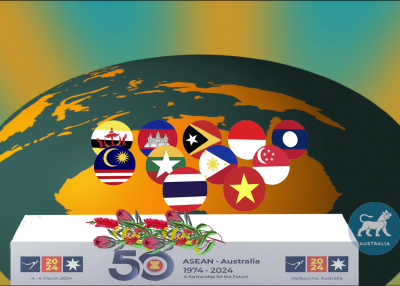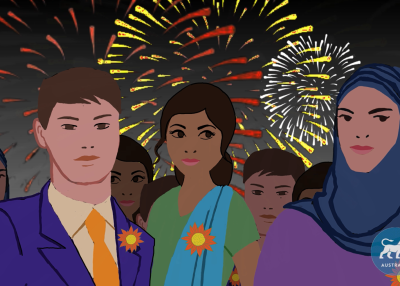Briefing MONTHLY #69 | December 2023
Year in review | From rising India to saving Tuvalu | Thai poll lessons | Diversifying trade | Statecraft rises | Taiwan votes | PLUS: Holiday reading
Illustration by Rocco Fazzari. View the full animation here.
NEW CHAPTERS
“If you only read the books that everyone else is reading, you can only think what everyone else is thinking,” Haruki Murakami once observed, perhaps ironically, between churning out his popular novels.
So, after a year of intimidating must reads (well, at least the executive summaries) ranging from the 208-page Southeast Asia economic strategy to the 112-page Defence Strategic Review to the 52-page development aid review, it’s time for broader horizons.
Some of my Asia Society Australia colleagues have suggested their summer reading (and viewing) options from and about the region for our annual end of year reading list. And I have curated a selection of new writing by Australian authors about Asia published this year. It’s an eclectic mix for summer reading or seasonal gift giving from romance in pre-war Java and Shanghai to an exploration of the rising Indian diaspora.
But first, a short recap of a still relatively new Australian government bedding down its approach to statecraft in a year of geo-political rivalry and possible economic fragmentation.
Thanks for reading this year.
Greg Earl
Briefing MONTHLY editor
NEIGHBOURHOOD WATCH
CHINA IN THE SLOW LANE
When the Chinese Communist Party’s top foreign policy official Liu Jianchao visited Australia last month, he was quick to pull out his briefing notes on the enduring heft of his country’s economy. Asked about an economic malaise, he claimed China’s annual economic growth was almost 50 per cent greater in dollar terms than back when the Australian bilateral free trade deal was being finalised in happier times.
But his country’s failure to rebound economically after its sudden reopening from the pandemic at the beginning of the year has been the shadow hanging over regional economic and strategic relations all year. The managers of the world’s biggest command economy have many levers they can still pull. But a troubled economy seems to have contributed everywhere from the grudging restoration of Australian trade, to pitching to American business rather than politicians at the San Francisco leaders’ summit, and then the cutting of tourist visa fees.
President Xi Jinping unusually conceded his “chairman of everything” stature was lacking in this domain at his end of year party address where he said: “Our country’s economic recovery is still at a critical stage. The development situation facing our country is complex.”
Foreign investment is being withdrawn for the first time since the late 1990s and deflation has been emerging in various measures through the year. At the more microeconomic level even Apple has started moving its once China-centric production to India and Vietnam and Chinese citizens are cancelling their health insurance due to loss of faith in the system.
This has seen some big calls about a historical turning point in China’s modern rise. Former Japanese finance minister Takatoshi Ito says China’s economic problems are similar to Japan in the 1980s, but much more home grown. This collaboration Who killed the Chinese economy between Foreign Affairs and the Peterson Institute for International Economics captures the bearish mood.
- This China Policy/Asia Society Australia briefing paper says greater centralisation, collapsing local government revenue and slowing household incomes have exacerbated challenges for the country’s economic managers. But DATAWATCH has a different image of China.
BHARAT OR BUST
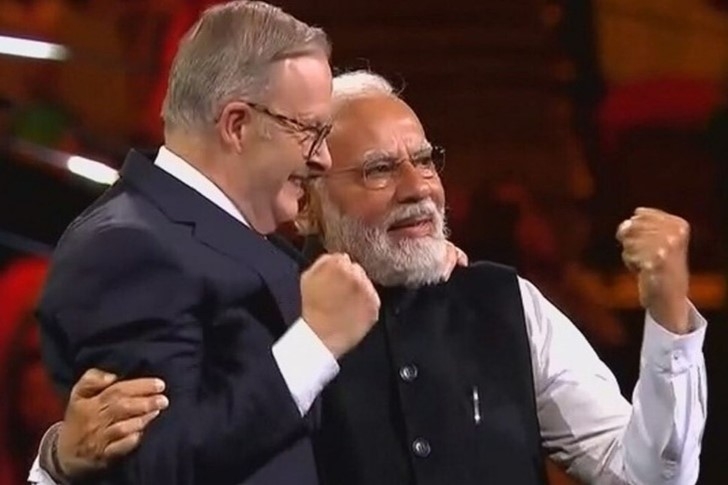
Bossmen … Anthony Albanese and Narendra Modi in Sydney. Picture: TheStatesman.com
It may now be a natural corollary to a troubled China, but India’s growing assertiveness has been the standout feature of this year in Asia, symbolically underlined by it becoming the world’s most populous country.
And the world has begun to shift, from Prime Minister Anthony Albanese dubbing his visiting counterpart Narendra Modi “The Boss” during an Indian diaspora event in Sydney to US President Joe Biden describing the US-India relationship as the “most consequential in the world.”'
India’s stock market is poised to take Hong Kong’s spot amongst the world’s biggest exchanges; Goldman Sachs has forecast it will be the world’s second largest economy by 2075 overtaking the US; and the country’s demographic dividend from a youthful working age population is expected to peak in 2030 but continue until 2055.
Modi used his hosting of the Group of 20 economic powers summit to burnish India’s credentials as the potential new leader of the Global South countries and promote a potential alternative to China’s Belt and Road Initiative in the form of a land sea corridor from India via the Middle East to Europe. And more symbolically, he floated the idea of replacing the British Empire name of India with Bharat, evoking an older pre-colonial Hindu era.
Voting last month in state elections suggests Modi’s Bharatiya Janata Party, the world’s largest political party, has recovered its momentum ahead of a national election by next May with the once dominant Congress Party now overshadowed by an unruly coalition of regional parties.
But the darker side of a new rising power has also been revealed with allegations that Indian state officials were complicit in the planned or actual assassinations of Sikh independence activists in North America and India’s reluctance to break with it long-time ally Russia over the Ukraine War. And India has taken the US reaction more seriously than it has taken that of Canada.
- At the Financial Times, Ruchir Sharma says Modi is crusing towards a third term in office. But John McCarthy warns at Asialink Insights that the “democratic solder” between India and Australia has become more brittle. And see Passages to India
VOTING GAMES
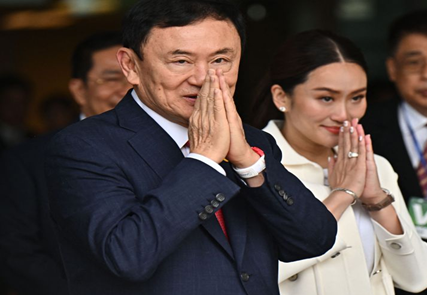
New dynasty … Paetongtarn Shinawatra welcomes her father back to Bangkok. Picture: AFP
As the Albanese government tries to hitch Australia’s economic wagon closer to what it sees as an emerging Southeast Asian locomotive, the quality of governance in these close Asian neighbours may come under more scrutiny.
This year started with rising hopes that Thailand’s near two decades of military manipulated democracy might be replaced by a new government led by the youth-oriented Move Forward Party, with a slate of reform policies. But it is ending with the one time face of a new sort of Southeast Asian democracy – Indonesia’s President Joko Widodo – reverting to old style dynastic politics by manoeuvring his son into possibly becoming the next vice-president.
It's another reminder that while voting – or electoral democracy – is alive and well in this region, liberal democracy with its associated accountability, policy debate and minority rights is still only slowly evolving.
That was underlined in Cambodia’s election where the landscape was filled with campaign posters for the tiny alternative Candlelight Party, for an election which was a managed walkover for long-serving Prime Minister Hun Sen’s Cambodian Peoples Party. The stronger alternative Cambodia National Rescue Party had been prevented from running and now Hun Sen has transferred power to his son.
In the region’s two longest running electoral democracies the story has some similar undertones. In Malaysia, Prime Minister Anwar Ibrahim, who has been both an establishment insider and outsider, is struggling to hold together a notional multi-racial government in the face of potential return to power by a more dirigiste Malay Muslim majority coalition. In the Philippines, President Ferdinand Marcos junior, the son a dictator, is set to become the face of democratic stability in the region with a lengthy six-year term. But internally he is facing a shadow dynastic battle with his Vice-President Sara Duterte, the daughter of his predecessor.
Back in Thailand, former exiled prime minister Thaksin Shinawatra appears to be wielding significant power from his Bangkok prison hospital with official Prime Minister Srettha Thavisin conceding he is in joint power with Thaksin’s daughter Paetongtarn, from the family-linked Pheu Thai Party. And with the election plurality-winning Move Forward Party forced into opposition, former coup leader turned military party prime minister Prayut Chan-ocha has now been appointed to the King’s Privy Council, where ultimate elite Thai power resides.
Nevertheless, Move Forward’s ability to win more seats than other old and new parties by appealing to young voters with clear alternative policies remains a beacon of hope for the region.
- At The Bangkok Post, Thitinan Pongsudhirak says a second-best, semi-democracy is still better than ten years of military rule. But at New Mandala, Nathaneal Sumaktoyo says Widodo is proving to be more dynastic than his predecessors.
ASIAN NATION
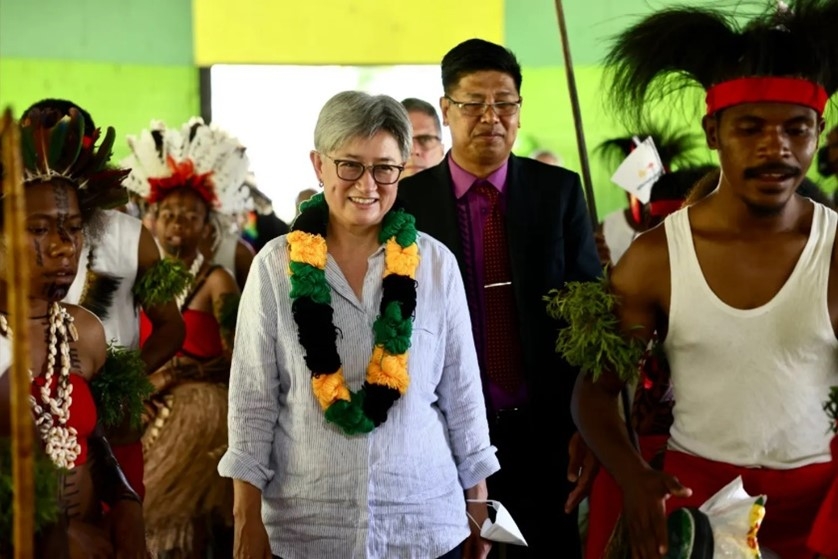
Frequent flyer … Penny Wong on a South Pacific visit
A NEW PACIFIC
The idea of moving towards greater integration between Australia and some Pacific countries to deal with security, development and climate change issues has been kicked around for years. The dollar is used in some countries and judges serve in others. But this year the dial shifted.
The Australia-Tuvalu Falepili Treaty signed on the sidelines of the Pacific Islands Forum establishes a special visa to allow Tuvaluans to live, work and study in Australia; additional money to support climate adaptation; and gives Australia effective veto power over Tuvalu agreements with, for example, China.
The Australia-Papua New Guinea Framework for Closer Security Relations has a treaty-like status that commits both nations to deeper information sharing and holding joint consultations in the face of any security threats. Australian police officers will now be able to serve within the PNG police service.
The government’s new aid policy (see below) raises the prospect of more direct government equity investment in the region in the wake of the support for Telstra buying the Digicel Pacific telecommunications business.
Foreign Minister Penny Wong nominates the Pacific engagement as first amongst her accomplishments as foreign minister describing it as “a change in the way in which we engage with the Pacific, playing much more to our strengths”.
But meanwhile, the Australia-Vanuatu Bilateral Security Agreement which set the pace a year ago for the latest agreements, is facing some opposition after a change of government in Vanuatu, underlying how this is unlikely to be a simple process.
In moving towards potential compacts with some stressed Pacific nations, Australia has always faced the challenge of finding a path between perceptions of neo-colonialism and avoiding the development of a Pacific ghetto in Australia. The swift evolution of the Pacific labour schemes from short term work in agriculture to more permanent work in a range of service industries now seems to have provided the pathway to potentially much greater integration.
- In this edited speech to the recent Australian AID Conference, Fiji’s Finance Minister Biman Prasad says a visa free Pacific “is the most basic building block for integration”.
STATE AID CRAFT
The Albanese government’s new development aid policy in August was a key stepping stone towards the later Pacific security agreements. But it also formalised three broad trends which had been under way for several years through Coalition and now Labor governments.
1: Budget finance remains curtailed below global benchmarks which only added to the shift towards the use of non-cash tools such as concessional debt, equity investments to encourage more private participation, and partly self-financing activity such as the Pacific labour scheme.
2: The focus on Australia’s closest neighbours in the Pacific and Southeast Asia and to a lesser extent South Asia at the expense of other parts of the developing world is made even clearer.
3: Meanwhile the shift towards integrating aid more closely with the diplomatic and defence wings of international relations policy is made quite explicit, to some extent downplaying the moral and poverty reduction objectives of traditional aid.
And so, it became the third leg of the government’s attempts to craft a whole of government “statecraft” approach to regional relations after the Defence Strategic Review embraced aid and diplomacy and the May Budget used the language of “investing in all elements of our statecraft including diplomatic power, trade and development”.
The policy warns that the region faces “vexing strategic circumstances” with security and economic dynamics that have existed for decades shifting. “Progress has been uneven and can be eroded quickly - as shown by the pandemic. Corruption, fragility, and poor governance continue to hold some countries back.”
But the three parts of Asia in focus were characterised in different ways:
The Pacific is framed as having longstanding bonds with Australia but facing rising challenges from climate change and debt which will require Australia to respect local priorities.
Southeast Asia is framed as a region with shared security and economic interests with Australia and opportunities for cooperation on protecting development gains with joint investments.
South Asia is framed as a region with growing ties to Australia where climate change and social inequality are cramping opportunities, but Australia can provide assistance in education, resilient cities and infrastructure.
- Richard Moore at The Interpreter argues the new approach to aid contains a “fundamental mismatch between compounding crises, complicating Australia’s strategic circumstances” and the policy’s “tepid responses.”
END OF TERM
International education is Australia’s fourth largest export revenue source and the largest services export at about $30 billion. But it is also often the first port of call for people-to-people diplomacy when ministers visit neighbouring countries and meet Australian educated alumni members (See DIPLOMATICALLY SPEAKING). And it is a source of employees for businesses entering the region.
The pressure to rein in surging post-pandemic immigration due to inflation and housing concerns has been building all year as some international students used low quality, short vocational courses as a back door to employment. Now the Migration Review has made those students the prime target for immigration cutbacks with debate about a new student tax or a cap. But this may have implications for how Australia is viewed abroad if it is not managed carefully.
Looking to the future, the revenue losses from fewer students is likely to increase pressure on educational institutions to expand their campuses on the ground in Asian countries.
The complicated interaction between students and eventual workers is underlined by the way the government has been quick to reassure India that last year’s trade agreement provision that gives certain Indian students more access to a long stay work visa will remain in place. But Indian student numbers have been growing faster than others amid the immigration surge meaning they may be more insulated from the cuts than students from other countries.
There are now more than 860,000 people in Australia on student visas or post-study work visas, amounting to more than three per cent of the total population. Here’s where they come from.
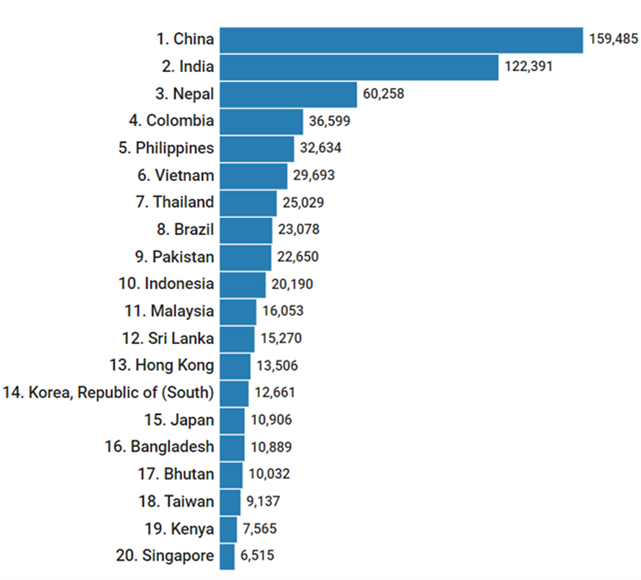
Source: Department of Education
DIPLOMATICALLY SPEAKING
"Education is the strongest foundation on which we can build the mutual respect that characterises the relationship between our nations … We see it in the 18,000 Indonesian students who choose to study in Australia each year - a choice I believe ultimately contributes to both of our nations."
- Prime Minister Anthony Albanese (Makassar, June 7, 2022)
"Dad brought back with him knowledge and skills … The value of that (Adelaide) education has never left him … I am glad that he is far from the only Malaysian to gain from an education in Australia … It is largely education that has been the foundation on which our countries - and our peoples - have built mutual respect and understanding."
- Foreign Minister Penny Wong (Kuala Lumpur, June 29, 2022)
"We’ve made it much too easy for people to use side doors and back doors into our workforce and the primary way that is happening at the moment is through international education and we need to fix that immediately."
- Home Affairs Minister Clare O’Neil (December 11)
"We’ve closed some of those loopholes, but we’ve got to close more of them if we’re going to protect the quality and the integrity of international education. I think it’s one of our greatest exports. It doesn’t just make our universities money, it helps to make sure that when students come here and then go home, they take with them a love and affection for Australia."
- Education Minister Jason Clare (December 12)
DEALS AND DOLLARS

DIVERSIFY OR ...
Stabilisation may have been the word of the year in Australia’s international economic engagement as the Albanese government has sought to unwind the remaining Chinese trade impediments.
But “diversification” is never far behind with three government-funded reports this year promoting new Asian markets beyond China, which are reviewed below. Meanwhile the Australian Chamber of Commerce and Industry (ACCI) trade survey has provided some useful insights into how this core government policy aim is travelling.
China has fallen from the top position in the list of active trade partners for the first time in the six periodic surveys conducted since the bilateral trade agreement was being finalised in 2014, to be replaced by the United States. Back in 2016 and 2018 at least 60 per cent of businesses surveyed were trading with China. But now that is down to 43 per cent. The US, on the other hand, has risen to 50 per cent from slightly below that in the pre-pandemic period.
These figures measure the countries with which Australian companies are trading rather than the value of trade where China remains the largest export and import partner, and while down on historic highs, appears to be recovering.
The big diversifications, very much in line with government policy initiatives, are India and Vietnam. India, with a partial trade deal newly in place and a bigger one promised, is up from 25 per cent to 32 per cent. Meanwhile Vietnam, which didn’t even make the top 22 cut in 2018 is now at 29 per cent, reflecting at least in part the enhanced economic engagement program.
And with the government now focused on closer economic relations with broader Southeast Asia to 2040, Vietnam trade is doing all the heavy lifting so far. The rankings for Malaysia (35 per cent) and Thailand (31 per cent) are unchanged over five years while Singapore (42 per cent) and Indonesia (26 per cent) are down.
To round out Asia and the top partners, Japan remains the fifth or sixth most popular trading partner with a consistent 35 per cent of businesses nominating it, while South Korea has risen a little to 26 per cent.
ASEAN bound: Promoting more investment was one of the key themes of the renewed government push into Southeast Asia including the Nicholas Moore-led economic strategy to 2040 and the government-led missions to get superannuation funds to invest in the region.
While it is too early to make assessments, the year has closed on a less than stellar investment note with Commonwealth Bank of Australia (CBA) and Ramsay Health Care each exiting two-decade old flagship Australian investments in the region. CBA sold its Indonesian retail network to Singapore’s OCBC which is expanding in the region. Ramsay sold its Malaysian/Indonesian hospital business to a larger regional health group including Malaysia’s Hong Leong Group.
Meanwhile the most significant new Australian investment project in the ASEAN region – the Sun Cable plan to build an undersea power cable from Darwin to Singapore - suffered some disruption from an investor split. Meanwhile there has been no announced move into the region yet by superannuation funds which are also being pressed to invest in the government’s domestic priorities.
The Moore report’s 75 recommendations are quite complex and do repeat some common ground from predecessors such as the 2021 Business Council of Australia/Asia Society Australia A Second Chance study. But they are very usefully organised in a matrix format of short and long-term priorities, and then again in neatly arranged core themes of raising awareness, removing blockages, building capacity, and finally deepening investment. Then they are re-organised across sectors and countries, all of which is critical in such a diverse region of 11 nations. See more analysis here.
Revisiting Thailand: With a new government finally in place in Thailand, a report on new bilateral business opportunities commissioned by the Australian embassy in Bangkok has some ideas for reinvigorating the relationship.
Its economic modelling finds that five Australian products are well placed to increase their value and volume in Thailand: meat and poultry; milk products; cereals and seasonings; beverages and tobacco; and cotton. And it says four Australian services emerge as competitive: tourism; finance; telecommunications, computer, and data services; as well as personal, cultural and recreational services. And the Thai products which have opportunities in Australia are: fish and processed fish; rubber, leather and shoes; non-electrical machinery; and electrical machinery.
It says the 20-year-old bilateral trade agreement should be updated to improve access specifically by including new areas such as e-commerce, competition, state-owned enterprises, environment, public procurement and small enterprises. Australian companies should also receive the same access in Thailand as US investors; Australia should do more to support the Thai government in analysing and removing domestic protectionist measures; and Austrade should move out of the embassy to become more accessible to Thai business.
Passages to India: With negotiations on a comprehensive trade agreement with India still dragging on, a series of 26 case studies of bilateral businesses underlines how much is already happening. They are produced by Newland Global Group with funding from the Australia India Council.
They range from Indian state-owned mining company National Mineral Development Corporation’s first overseas purchase of Australia's Legacy Iron Ore to how Australian virtual reality business Zero Latency has opened free roam reality rooms in India in association with Indian entertainment company Samrey Entertainments.
DATAWATCH
CHINA IN THE FAST LANE
Trends in scientific publications
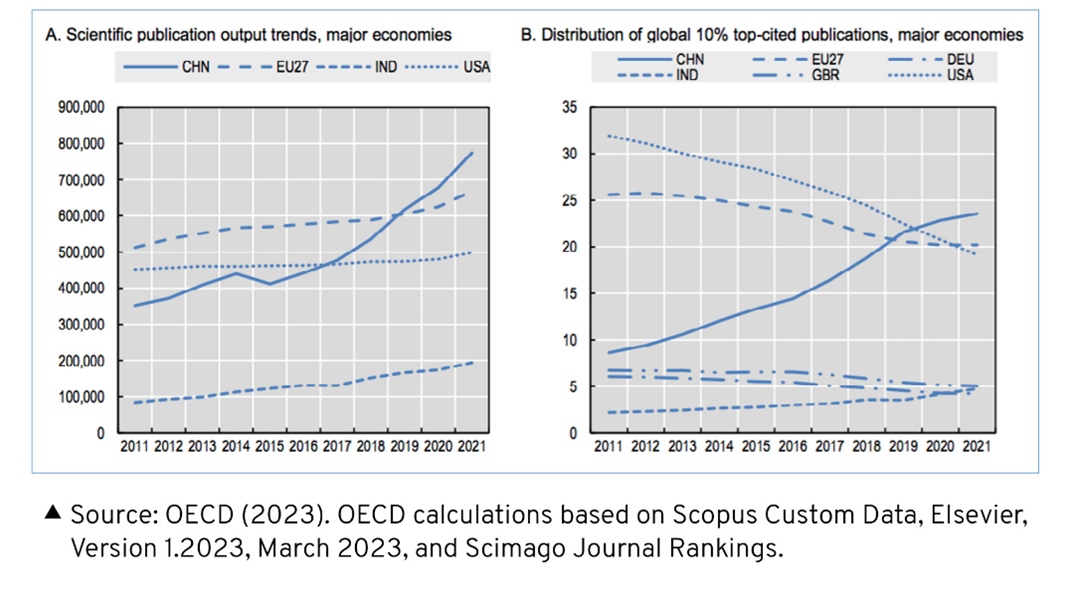
Trends in renewable energy capacity (Gw)
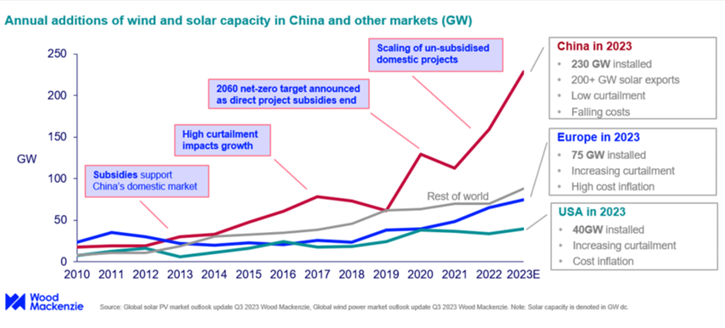
ON THE HORIZON
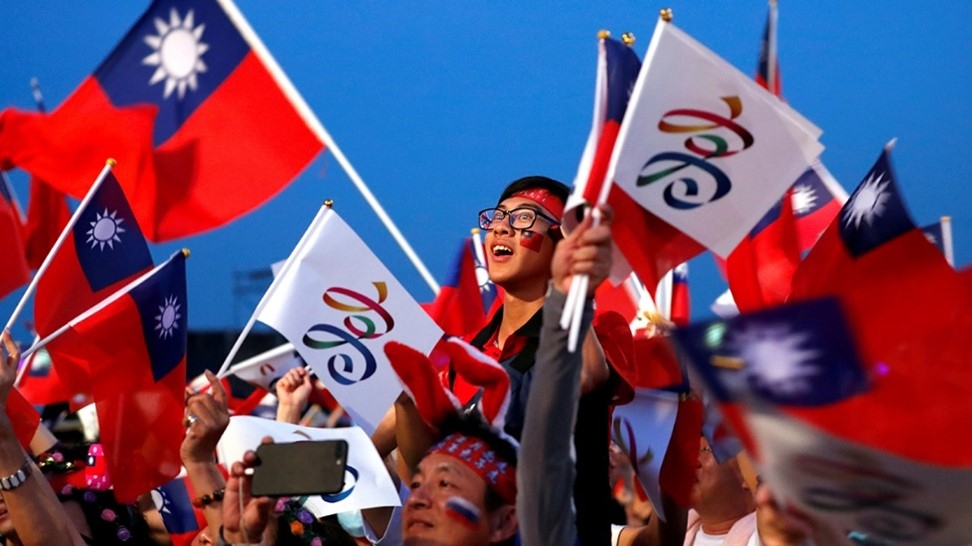
TAIWAN VOTES
There are big elections in Asia next year starting with the highly contested and geo-politically sensitive vote in Taiwan on January 13 for a new president and its parliament, the Legislative Yuan.
Opinion polls suggest the Democratic Progressive Party's William Lai is leading the race to replace his DPP colleague Tsai Ing-wen (who cannot stand again after two terms) as president, although he has been losing momentum.
Lai is facing a competition with the once dominant Kuomintang (KMT) Party's Hou You-yi and a candidate from the newer Taiwan Peoples Party Ko Wen-je, in a first-past-the-post race, along with a fourth minor candidate. A Lai victory would likely lead to at least some new rhetorical tensions with China over independence if not more significant intimidation, while both Hou and Ko favour more engagement with China.
Taiwanese voters identify as Taiwanese rather than Chinese underpinning the DPP’s successful China-phobic presidential campaigns in recent years. But the party is now seen more as the establishment, meaning voters could be looking for a change for domestic rather than foreign policy reasons. Housing, power blackouts and living costs have featured in the campaign apart from China relations.
The Legislative Yuan is chosen by a more complex mix of individual and party list proportional members for 113 seats, meaning the DPP has a harder task retaining its majority there.

Richard Maude
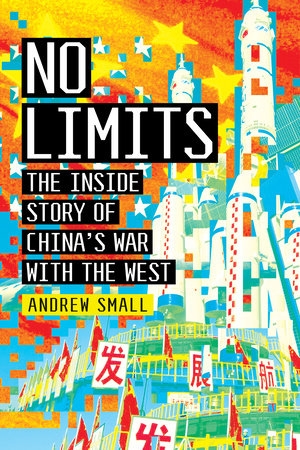
No Limits: The Inside Story of China’s War with the West by Andrew Small
These days, European leaders have no small list of concerns about China– everything from human rights to Taiwan to calls for a more “reciprocal” economic relationship. China is no longer just a partner but also a competitor and systemic rival. Andrew Small’s book is a fascinating account of how the mood in Europe (and in the West more broadly) has shifted, at least up to a point. Small argues the re-think has been driven not by “hostile know-nothings who wanted to see [China] fail, but by many of the people who had been closest to it” – in short, those with a ringside seat to China’s more ideological, authoritarian, and assertive tilt under Xi Jinping.
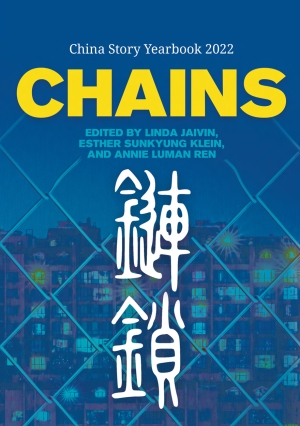
Chains: China Story Yearbook 2022 Edited by Linda Jaivin, Esther Sunkyung Klein, and Annie Luman Ren
For nearly a decade, the Australian National University’s Australian Centre on China in the World has produced a China Story Yearbook. From its inception, the project’s philosophical underpinning has been that China’s story is not only the official version laid down by the Chinese Communist Party, but one woven by “a multitude of others” within and outside China. The theme of the 2022 Yearbook is chains, literal and symbolic. The diverse collection of articles tracks lockdowns, chains on women, supply chains, and worries about conflict over island chains (Taiwan and the South China Sea). There’s much more – the 2022 edition is typically rich and illuminating, not to mention beautifully produced.
Richard Maude is the Executive Director of Policy at Asia Society Australia, and Senior Fellow at the Asia Society Policy Institute.
Majdina Widodo
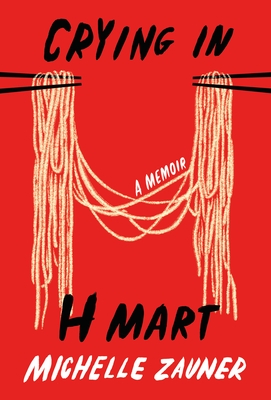
Crying in H Mart: A Memoir by Michelle Zauner
Michelle Zauner's heartfelt memoir delves into her journey of self-discovery and coping with grief after her mother's battle with cancer. Through reflections on her Korean heritage and the role of food, particularly her connection to the Korean grocery store H Mart, Zauner navigates the complexities of identity and the enduring impact of loss on family bonds.

Little Forest directed by Yim Soon-rye
This Korean film follows the life of Hye-won who returns to her rural hometown, seeking solace from the challenges of city life. The film unfolds through the changing seasons as Hye-won reconnects with nature, cultivates her own food, and rediscovers the simplicity and richness of life, emphasising themes of self-discovery and the healing power of nature.
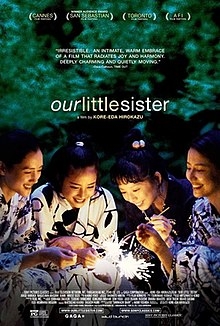
Our Little Sister directed by Hirokazu Kore-eda
This Japanese film depicts the lives of three sisters who invite their half-sibling to live with them after their estranged father's funeral. The film explores themes of family dynamics, sisterhood, and the complexities of relationships as the four siblings navigate their shared history and create a new, unconventional family structure. The narrative is an introspective exploration of love, loss, and the enduring bonds that tie people together.
Majdina Widodo is the Digital Content Producer at Asia Society Australia.
Natalie Sambhi
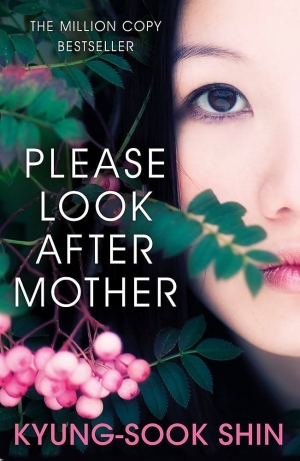
Please Look After Mother by Shin Kyung-sook
A tragically beautiful novel that explores what happens after the illiterate matriarch of a South Korean family goes missing in Seoul subway station, peeling back the layers of intergenerational change, familial relations, the urban–rural divide, nostalgia for traditions and customs, and motherhood.
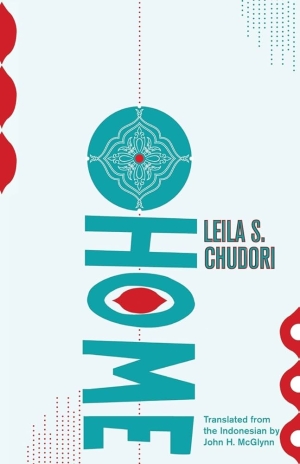
Home by Leila Chudori
A fictional account of Indonesians who, after the tumultuous events of 1965, find themselves political exiles, estranged from their beloved homeland which now seeks the unbridled extermination of Communist sympathisers. Notable for grappling with a taboo topic in contemporary Indonesia, the novel sheds light on the human impact of Suharto’s rise.
Dr Natalie Sambhi is a Senior Policy Fellow at Asia Society Australia.
Sarah van Heeswyk
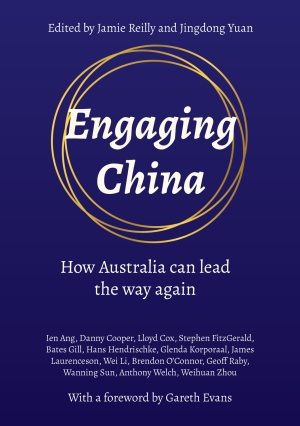
Engaging China – How Australia can lead the way again. Edited by Jamie Reilly and Jingdong Yuan
At a crucial moment in bilateral relations, this collection of essays offers a full-throated defence of engagement. The volume brings together a diverse set of Australia’s seasoned diplomats, experienced journalists and renowned scholars to assess the current state of Australia–China relations and offer pragmatic advice for how Australia can restore a healthy and stable relationship with China.
Sarah van Heeswyk is the Associate Director of Communications at Asia Society Australia.
Aster Haile
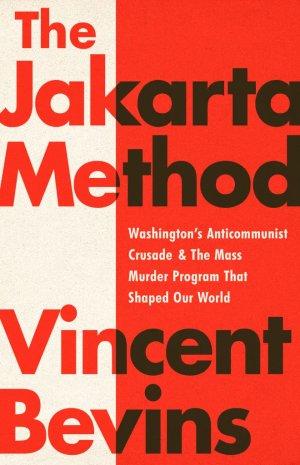
The Jakarta Method by Vincent Bevins
This book argues the 1965 Indonesian coup, supported by the then US government, was one of the most important turning points of the twentieth century. Bevins says that by eliminating the largest communist party outside China and the Soviet Union and then inspiring copycat terror programs in faraway countries like Brazil and Chile, the US was pursuing a victory in the Cold War. But these events remain widely overlooked, because the CIA’s secret interventions were so successful.
Aster Haile is the Program Manager at Asia Society Australia.
Genevieve Donnellon-May
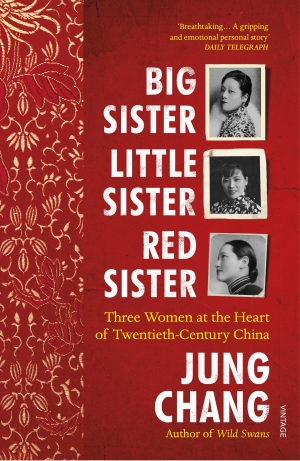
Big Sister, Little Sister, Red Sister by Jung Chang
Examines the lives of the fascinating politically connected Soong sisters in 20th century, who helped shaped China and Taiwan. Red Sister, Ching-ling, married the 'Father of China', Sun Yat-sen, and rose to be Mao's vice-chair; Little Sister, May-ling, became Madame Chiang Kai-shek, first lady of pre-Communist Nationalist China and a major political figure in her own right; Big Sister, Ei-ling, became Chiang's unofficial main adviser - and made herself one of China's richest women.
Genevieve Donnellon-May is a Research Associate for the Asia Society Policy Institute.
James Scullin
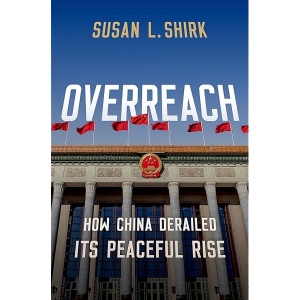
Overreach: How China Derailed Its Peaceful Rise by Susan L. Shirk
In this expansive account of how modern China came into being, Susan Shirk outlines the various phases of China’s economic and political development under each of China’s leaders from Mao to Xi. Interestingly, the book argues that the weakness and corruption of the Hu Jintao period brought about the need to professionalise the party and centralise the state as much as Xi’s own ambition to steer the country. The book delves into fascinating detail in explaining the mechanisations of China’s secretive leadership selection process and the informal processes that meld the traditional Chinese and Leninist approaches of elite Chinese politics.
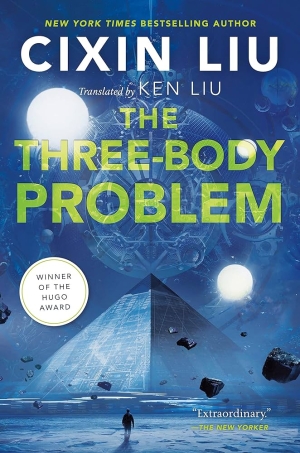
The Three-Body Problem by Liu Cixin
This three-part trilogy by science fiction writer Liu Cixin outlines humanity’s response and evolution after making contact with an alien civilisation. In a story that begins in China’s cultural revolution and runs thousands of years into the future, the series is a thoughtful, scientific and unique approach to the science fiction genre that focuses on Earth’s attempts and struggles to respond collectively to an interstellar threat. The series, already well known to Chinese readers, will gain greater attention in 2024 when it appears as a Netflix series, produced by the showrunners of Game of Thrones.
James Scullin is the Director of Programs for Asia Society Australia.
Greg Earl
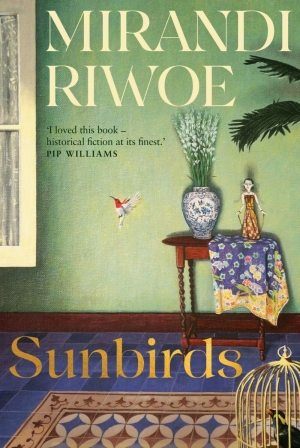
Sunbirds by Mirandi Riwoe (UQP)
This is family love story set in colonial Dutch Java on the eve of the Pacific War amid the changing identities and loyalties created by the intersection of the independence movement and war. It weaves the stories of a young woman from a wealthy Dutch plantation family and an Indonesian housekeeper with independence connections along with a separate novelette about colonialism. The mix of Dutch and Indonesian language used by Riwoe, a Brisbane writer with a Chinese Indonesian father, evokes the changing times. And Australia beckons as a refuge from the looming violence.
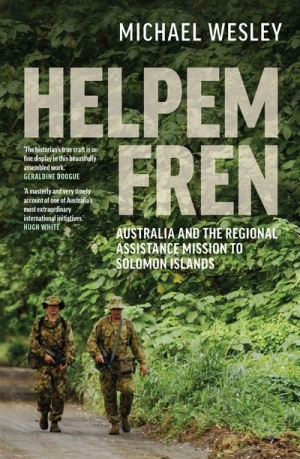
Helpem Fren by Michael Wesley (MUP)
When Australia ended its 14-year Regional Assistance Mission to Solomon Islands (RAMSI) in 2017, the celebratory mood was a stark contrast to other recent withdrawals from nation building in places like Afghanistan. This comprehensive history of an exercise which cost more than $2 billion and drew ad-hoc resources from across regional governments is particularly timely as Australia embarks on a more formalised whole-of-government statecraft in the Pacific. Wesley, a Melbourne University vice-chancellor and Indian migrant’s son, explains how what was seen as a successful intervention when it ended has, in the light of more recent tensions with Solomons Prime Minister Manasseh Sogavare, the left Australia with a both intimate and unpredictable relationship.
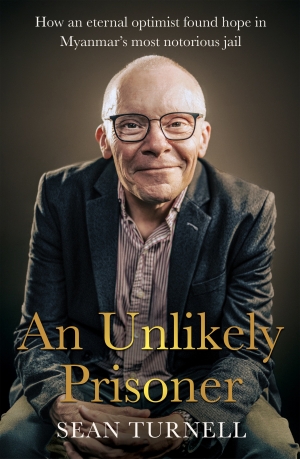
An Unlikely Prisoner by Sean Turnell (Penguin)
After being released from prison in Myanmar, Sean Turnell wrote this book in a doleful mood about the fate of both his former National League for Democracy government colleagues still imprisoned by country’s military junta and the country’s people. But the former Macquarie University academic turned adviser to Aung San Suu Kyi, personally emerges as remarkably good humoured about his own experience from obtaining a supply of books to negotiating about whether he could have a chair. He devotes the book to his liberators and protectors who “turn up unexpectedly, and in the most unlikely and unlooked-for places.”
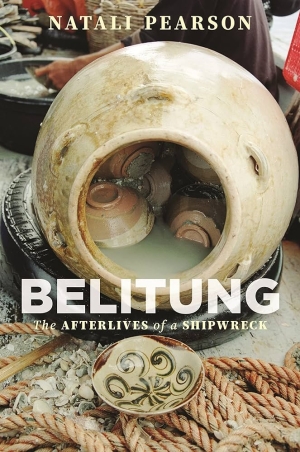
Belitung by Natali Pearson (University of Hawaii Press)
The discovery of the ninth century ship now known as the Belitung in Indonesian waters in 1998 evoked a very different world when Chinese Tang dynasty gold and other precious objects were being shipped via the original maritime silk road to the Middle East. But Pearson, a Sydney University marine archaeologist, has managed to turn this discovery into a detective story, an exploration of international legal and cultural diplomacy, and a reflection on how to deal with an unexpected time capsule. She takes the story from the commercial life of a distant millennium to the modern economic reality where Singapore managed to secure, and display, most of the treasures from a ship found in its larger neighbour’s waters.
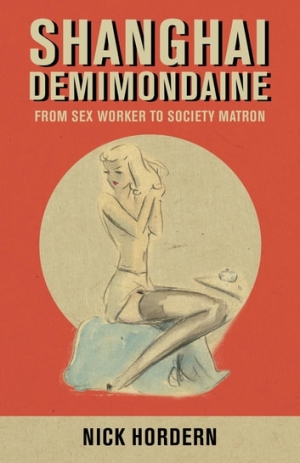
Shanghai Demimondaine by Nick Hordern (Earnshow Books)
Pre-World War 2 Shanghai was the place to be for a remarkable collection of fortune seekers from foreign correspondents to revolutionaries all preserved in the abundant literature about that time. But Hordern has now skilfully captured a less important but equally remarkable hitherto unknown Australian woman’s life substantially formed by her time as an associate in many different ways to those Shanghai fortune seekers. Lorraine Murray was known by as many as eleven names during her colourful life in Australia, Asia, Europe and North America escaping from tough start in Adelaide, which Hordern has pieced together from literature, family interviews and archives.
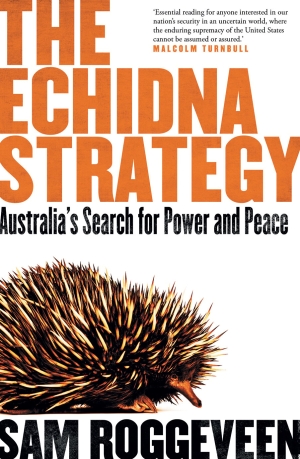
Shanghai Demimondaine by Nick Hordern (Earnshow Books)
Pre-World War 2 Shanghai was the place to be for a remarkable collection of fortune seekers from foreign correspondents to revolutionaries all preserved in the abundant literature about that time. But Hordern has now skilfully captured a less important but equally remarkable hitherto unknown Australian woman’s life substantially formed by her time as an associate in many different ways to those Shanghai fortune seekers. Lorraine Murray was known by as many as eleven names during her colourful life in Australia, Asia, Europe and North America escaping from tough start in Adelaide, which Hordern has pieced together from literature, family interviews and archives.
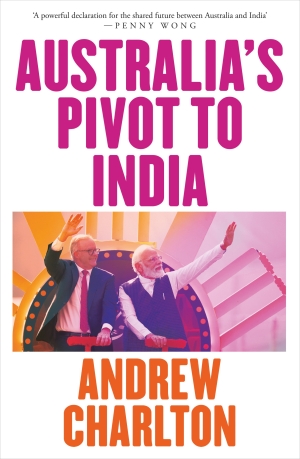
Australia’s Pivot to India by Andrew Charlton (Black Inc)
Indians are fast emerging as Australia second largest diaspora community depending on the measuring stick, which puts former economist Andrew Charlton in an interesting political hotseat as the Labor Member for Parramatta in Sydney, which is one of the largest Indian communities. He has staked his claim to this evolving electorate with a book which is part a look at rising India, part an exposition of the Albanese government’s approach to the diplomatic relationship, and part a look inside this important migrant group. He argues the growing diaspora has become an essential guide to navigating the complexity of modern India.

Chai Time at Cinnamon Gardens by Shankari Chandran (Ultimo Press)
A novel set in a western Sydney retirement home might be an unlikely listing here, but it says a lot about Australia’s changing demography. Chandran, a lawyer of Tamil origins, had trouble getting her first writing published for not being sufficiently “Australian,” but has now won the Miles Franklin prize for this book about Sri Lankan refugees carving out a life in a new country amid the unresolved tensions from their homeland. She deftly weaves the many sub-plots together. As the judges said: “It treads carefully on contested historical claims, reminding us that horrors forgotten are horrors bound to be repeated.”
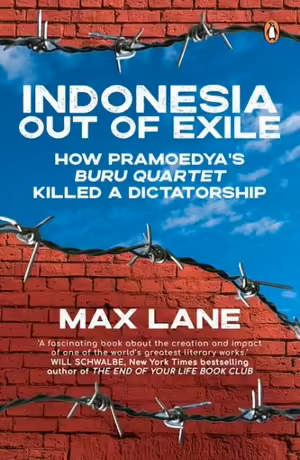
Indonesia out of Exile by Max Lane (Penguin)
Indonesia’s emergence from authoritarianism to today’s imperfect but feisty democracy owes something to the sweeping historic novels about the country’s independence era written by Pramoedya Ananta Toer during his time in prison in the 1970s. And Lane, a former Australian diplomat, played his role as the translator of the quickly banned novels while his former diplomat colleagues were trying to maintain relations with the long-ruling Soeharto regime. The book recounts the story of the arrest of Pramoedya (and his compatriots), the writing of the novels and their publication in the 1980s after the Indonesian author’s release into a very different country.

Tenderheart by Hetty Lui McKinnon (Plum HB)
This is notionally a book about exquisite vegetarian cooking and thus in part a guide to how to treat these ingredients particularly well. But it is also a memoir of the food writer’s late Chinese immigrant father Wai Keung Lui, or Ken, who worked in Sydney’s wholesale fruit and vegetable market and at a Chinese restaurant, providing the early inspiration for McKinnon’s previous books including From Asia, With Love. “My dad was a foodie before the term existed, often introducing us to new ingredients and foods that were not common in a Chinese immigrant household,” she recalls as she adopts her dad’s surname for this latest book.
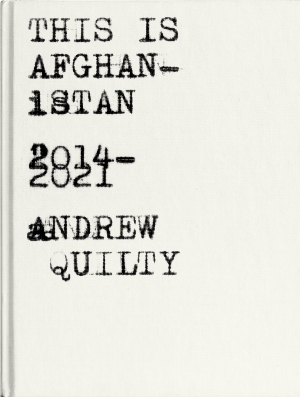
This is Afghanistan 2014-2021 by Andrew Quilty (MUP)
Quilty, a photo-journalist, was one of the few foreign reporters to stay behind in the country he had begun to call home when international military forces withdrew and the Taliban returned to power in Afghanistan. He wrote about that choice and his experiences in an earlier book, but this evocative collection of his photographs displays his real art. It will become a valuable historic record of a country which has experienced savage swings between perhaps unrealistic hopes for a place in the modern world and isolation.
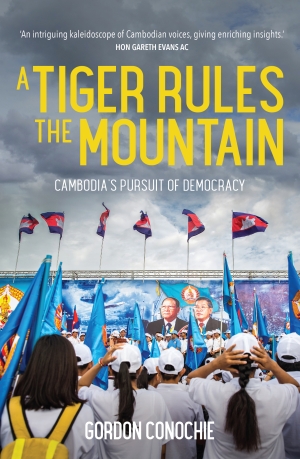
A Tiger Rules the Mountain by Gordon Conochie (Monash)
Cambodia’s election, as noted above, was one of the low points of the year for Asia’s democratic evolution. But this book reinforces something that was striking during my own pre-election visit – ordinary Cambodians can be quite frank about their political predicament despite the crackdown on media freedom and opposition parties. Conochie, an academic, brings to life a remarkable array of voices from across the country hoping for a return to the more open climate that existed in the time after the end of the Khmer Rouge genocide.
Greg Earl is the Briefing MONTHLY editor.
ABOUT BRIEFING MONTHLY
Briefing MONTHLY is a public update with news and original analysis on Asia and Australia-Asia relations. As Australia debates its future in Asia, and the Australian media footprint in Asia continues to shrink, it is an opportune time to offer Australians at the forefront of Australia’s engagement with Asia a professionally edited, succinct and authoritative curation of the most relevant content on Asia and Australia-Asia relations. Focused on business, geopolitics, education and culture, Briefing MONTHLY is distinctly Australian and internationalist, highlighting trends, deals, visits, stories and events in our region that matter.
Partner with us to help Briefing MONTHLY grow. For more information please contact [email protected].

